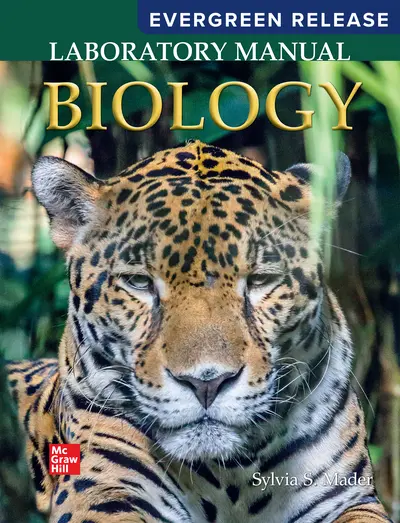My Account Details

ISBN10: 1264695489 | ISBN13: 9781264695485

* The estimated amount of time this product will be on the market is based on a number of factors, including faculty input to instructional design and the prior revision cycle and updates to academic research-which typically results in a revision cycle ranging from every two to four years for this product. Pricing subject to change at any time.
Instructor Information
Quick Actions (Only for Validated Instructor Accounts):
The laboratory exercises in this manual are coordinated with Biology, a general biology text that covers the entire field of biology from an evolutionary perspective.
Although each laboratory is referenced to the appropriate chapter(s) in Biology, this manual may also be used in coordination with other general biology texts. In addition, this laboratory manual can be adapted to a variety of course orientations and designs. There are a sufficient number of laboratories and exercises within each lab to tailor the laboratory experience as desired. Then, too, many exercises may be performed as demonstrations rather than as student activities, thereby shortening the time required to cover a particular concept.
1 Scientific Method
2 Metric Measurement and Microscopy
3 Chemical Composition of Cells
4 Cell Structure and Function
5 How Enzymes Function
6 Photosynthesis
7 Cellular Respiration
UNIT II Genetics
8 Mitosis: Cellular Reproduction
9 Meiosis: Sexual Reproduction
10 Patterns of Inheritance
11 Human Genetics
12 DNA Biology and Technology
UNIT III Evolution
13 Evidence of Evolution
14 Natural Selection
UNIT IV Microbiology and Evolution
15 Bacteria and Protists
16 Fungi
UNIT V Plant Evolution and Biology
17 Nonvascular Plants and Seedless Vascular Plants
18 Seed Plants
19 Organization of Flowering Plants
20 Water Absorption and Transport in Plants
21 Control of Plant Growth and Responses
22 Reproduction in Flowering Plants
UNIT VI Animal Evolution and Diversity
23 Introduction to Invertebrates
24 Invertebrate Coelomates
25 The Vertebrates
UNIT VII Comparative Animal Biology
26 Animal Organization
27 Basic Mammalian Anatomy I
28 Chemical Aspects of Digestion
29 Basic Mammalian Anatomy II
30 Homeostasis
31 The Nervous System and Senses
32 Musculoskeletal System
33 Development
UNIT VIII Ecology
34 Sampling Ecosystems
35 Effects of Pollution on Ecosystems
Need support? We're here to help - Get real-world support and resources every step of the way.